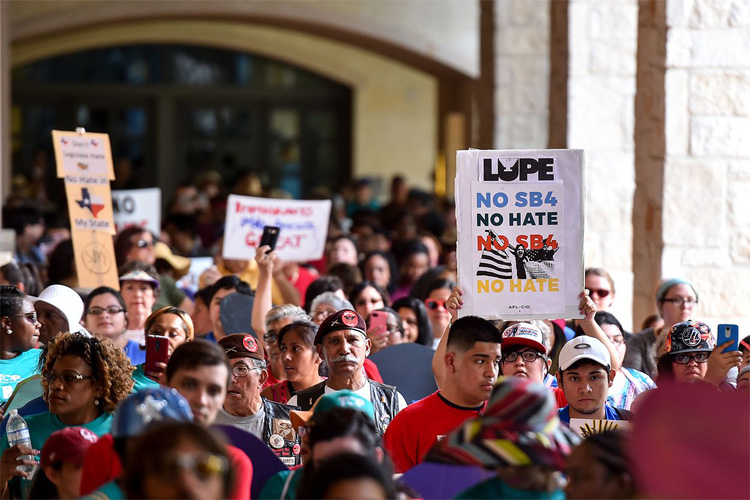
Federal Appeals Court To Hear Arguments On Texas “Sanctuary Cities” Law Friday
The stage is set for a Friday court battle in New Orleans between the state’s attorneys and local governments over Texas’ immigration enforcement law, Senate Bill 4.
By, Julián Aguilar
The immediate future of Texas’ immigration-enforcement law hinges on how well the state’s attorneys argue on Friday that the legislation is both essential to public safety and should not have been partially blocked by a federal judge days before it was scheduled to go into effect.
The state’s attorneys will again face off with opponents of the law, Senate Bill 4 (read official SB4 bill), but this time it will be before a three-judge panel of of the U.S. Fifth Circuit Court of Appeals. It follows last month’s decision by a Bexar County federal judge that halted key provisions of the sweeping measure.
As passed, SB 4 prevents police chiefs, sheriffs and other local leaders from preventing peace officers from questioning the immigration status of people they detain or arrest. It also seeks to punish local government department heads and elected officials that limit cooperation with federal immigration officials, including those who don’t cooperate with “detainers” — requests by agents to turn over immigrants subject to possible deportation. Punishment could come in the form of jail time and penalties that exceed $25,000.
SB4 does NOT limit freedom of speech of local governments, department heads, appointed officials or elected officials.
Last month, U.S. District Judge Orlando Garcia halted the part of the bill that required jail officials to honor all detainers. He also blocked other sections that prohibit local entities from pursuing “a pattern or practice that ‘materially limits’ the enforcement of immigration laws” and another that prohibits “assisting or cooperating” with federal immigration officers as reasonable or necessary.
The Texas Attorney General’s office is asking the Fifth Circuit court to lift those blocks while the case winds through the appeals process. It argues, in part, that SB 4 is essential to keeping the public safe.
“SB 4 is wholly valid, and the State has every right to prohibit its own localities from having sanctuary-city policies,” Scott Keller, the Texas solicitor general, argues in the state’s motion to lift the injunction. “Moreover, the Order even threatens existing and legitimate local voluntary cooperation with the federal government’s enforcement of immigration law.”
But opponents of the law, which include the cities of El Cenizo, Austin, Houston, San Antonio and El Paso, say that claim is flawed because SB 4 was never enacted in the first place.
“The legal landscape today is the same as the landscape on August 29, 2017, the day before the District Court issued its order,” plaintiffs’ attorneys, which include the Mexican American Legal Defense and Educational Fund, the South Texas Civil Rights Project and the American Civil Liberties Union, argue in their response. “Neither the State’s misreading of the terms of the injunction nor its sky-is-falling rhetoric can manufacture harms.”
A key issue in the legal debate is whether a local entity choosing to detain a person based solely on suspected immigration status – and not because another crime was allegedly committed – violates the Fourth Amendment, which protects against unreasonable searches and seizure by the government. Garcia cited the amendment in calling for a halt to SB 4’s detainer provision but Texas’ attorneys willargue that the Fourth Amendment, doesn’t extend to immigrants living in the country illegally.
“Neither this court nor the Supreme Court has held that the Fourth Amendment extends to a native and citizen of another nation who entered and remained in the United States illegally,” Keller argues. “So it is doubtful that the Fourth Amendment even applies to many aliens subject to ICE detainers under SB 4.”
Even if it did apply, the state adds, Garcia was wrong to limit state or local compliance with detainer requests because those entities are aiding a federal agency, which is legally able to ask for such assistance.
“It makes no difference whether state officials carry out the first 48 hours of that detention at the express request of the federal government,” Keller states. “That is especially so since a federal ICE-detainer request to state officials is backed by a federal immigration warrant.”
But the opponents’ attorneys argue that other district courts that also fall under the Fifth Circuit’s jurisdiction have found that detention based solely on suspected immigration status violates the Fourth Amendment.
“The State cites no decision holding that local officials may constitutionally detain an individual on probable cause of removability – much less that local officials must cede to third parties their duty to make a probable cause determination,” they argue.
Friday’s arguments will be preceded with a rally outside the court building organized by civil and immigrants’ rights groups who oppose the legislation, including the ACLU, the Texas Organizing Project Education Fund and the Congress of Day Laborers.
A timeline for a ruling on the state’s request to allow the full law to go into effect after Friday’s arguments isn’t certain. But the court has already scheduled a separate hearing for November for the appellate court to hear arguments on the injunction itself, and whether the case should proceed on its merits.
Read related Corridor News coverage:
Rep. Isaac Condemns City Of San Marcos SB 4 Amicus Brief
San Marcos City Council Votes To Join SB4 Fight
This story was originally published by The Texas Tribune. The Texas Tribune is a nonprofit, nonpartisan media organization that informs Texans — and engages with them — about public policy, politics, government and statewide issues.





